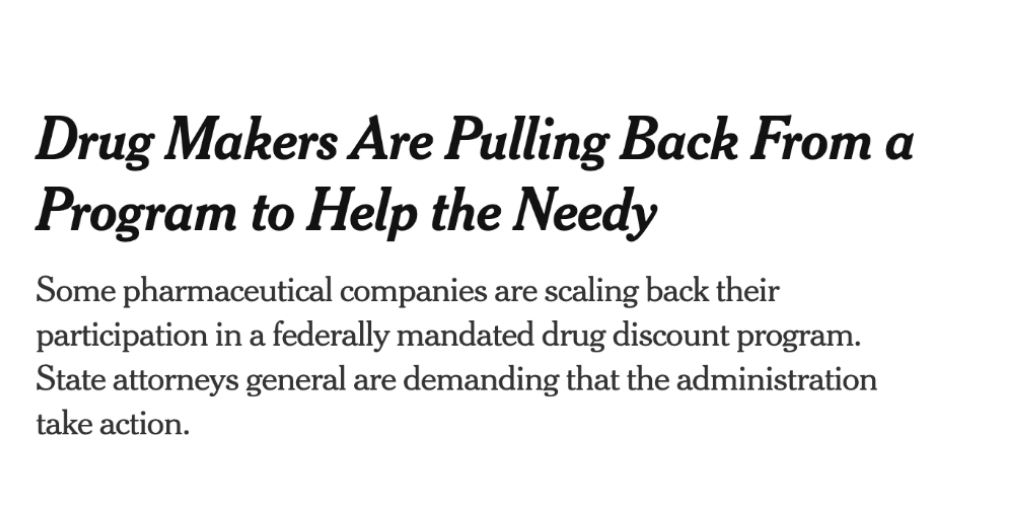
The headline and deck on the Dec. 15 online version of New York Times correspondent Sheryl Gay Stolberg’s article about pressure on HHS to act on drug manufacturers’ denials of 340B pricing.
The New York Times, Often a Public Policy Shaper, Runs Article on 340B Pricing Denials
The New York Times has published a news article about “top pharmaceutical companies [that] have stopped giving federally mandated drug discounts to hospitals and clinics that care for the poorest Americans,” and the bipartisan pressure building on outgoing U.S. Health and Human Services (HHS) Secretary Alex Azar “to demand reinstatement of the price breaks or punish the firms.”
The story by the newspaper’s Washington correspondent Sheryl Gay Stolberg, who focuses on health care policy, first ran online early last night and today in the print edition’s business section.
The Times is one of the country’s most highly regarded news organizations. It doesn’t report on the 340B program often. But when it has before, its articles have helped catalyze the policy debate about the drug discount program.
Stolberg’s article is pegged to Monday’s letter by 29 state attorneys general—including California AG Xavier Becerra (D), the person in line to replace Azar at HHS—insisting that Azar address denials of 340B pricing by Eli Lilly and Co., AstraZeneca, Sanofi, Novartis, United Therapeutics, and Novo Nordisk.
“The health secretary needs to step in here and make sure that prescription drugs are provided to people that need them right now in the middle of a pandemic,” Attorney General William Tong of Connecticut (D), who is leading the bipartisan effort along with Becerra, Kansas Attorney General Derek Schmidt (R), and Nebraska Attorney General Doug Peterson (R), told Stolberg. “It really stuns me that companies do not seem to understand that people need access to health care and prescription drugs, literally, to live.”
Stolberg wrote that “clinics and pharmacies that serve the poor” say the drug companies’ action “violates federal law and has been devastating—both to patients and to their own budgets—in the middle of an economic downturn spurred by the worst pandemic in 100 years. They say that the cutbacks are illegal and that now is not the time to reduce discounts that help them better serve the poor.”
Drug companies, she wrote, say that “some hospitals and clinics were exploiting [340B] to pad their own bottom lines, and that “individual patients are not being hurt” by their 340B pricing denials.
“Drug makers say that 340B has grown far bigger than Congress intended, costing them tens of billions of dollars each year in part because of a decision by the health resources agency about 10 years ago to extend the discounts to pharmacies that contract with eligible hospitals and health centers,” she wrote.
Stolberg interviewed attorney William von Oehsen of Powers Law (a 340B Report sponsor), who called the 340B program a “vital financing tool” and said drug companies “need to do their part to lower costs for these providers that are highly dependent on taxpayer support.”
Sue Veer, president and CEO of South Carolina-based Carolinas Health Centers, told Stolberg that cutting off 340B pricing for drugs shipped to contract pharmacies would “reduce the savings that my health centers can retain and then invest back into primary care, things like behavioral health and substance abuse programs,” or programs for people who have H.I.V.
Lilly Senior Director, Government Strategy Derek Asay told Stolberg that the 340B statute does not contemplate contract pharmacies, and that the program had been “plagued with abuses and problems with integrity.”
Sanofi spokesperson Ashleigh Koss told Stolberg the company refuses to grant discounts to providers unwilling to provide data “necessary to identify and prevent waste and abuse.”
The article also features covered entities with specific examples of how costs have grown dramatically for their patients as result of the manufacturer actions. They expressed concern that their patients will go without needed medicines as result of these steps.
Kalderos Will Let Providers Opt Out of 340B Rebate Model, for Their Own Pharmacies Only
Drug industry reimbursement vendor Kalderos announced this morning that it has changed its 340B Pay platform to let covered entities “choose whether to use the rebate model for their own pharmacies, or maintain their existing process of upfront discount and wholesaler chargeback,” Steve Zielinski, Kalderos Senior Director, Industry Relations, said in an email to 340B stakeholders this morning. But “the rebate model will still be the only way for covered entities to receive 340B prices on applicable products dispensed at their contract pharmacies, which remain the most challenging sites for compliance,” he said.
Kalderos also issued a news release this morning about the change.
It is unclear if the company’s concession will be enough to satisfy covered entity groups and members of Congress, who want federal health care officials to tell manufacturers and their vendors they cannot unilaterally change providers’ 340B drug reimbursement from up-front discounts to back-end rebates.
We will have more on this late breaking development in tomorrow’s 340B Report.

